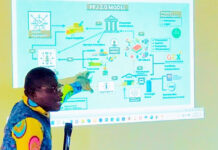The Chief Executive Officer (CEO) of Global Media Foundation (GLOMEF), Mr. Raphael Godlove Ahenu Jnr., has expressed grave worry over the situation where Ghanaian farmers are resorting to the use of harmful agrochemicals in their farming activities.
This dangerous trend, from clearing the land to harvesting, not only fails to support climate change mitigation efforts, but also leads to alarming effects as over 45,000 people are affected by floods annually in Ghana.
The disclosure was made during the National Grantees Forum at Abesim, near Sunyani, under the theme: “Bringing Members Together for Strategy and Network.”
The event was sponsored by the Green Grant Fund (GGF) Ghana and organised by GLOMEF to address the pressing environmental challenges facing the nation.
Mr. Ahenu Jnr. emphasised that Ghana suffered significant financial losses due to floods, with the devastating impact exacerbated by human activities directly contributing to climate change.
The utilisation of agrochemicals in farming, reckless construction in waterlogged areas, wholesale deforestation for agricultural purposes, and tree-cutting for building constructions all play a pivotal role in driving climate change and, subsequently, causing rampant flooding.
Furthermore, he pointed out that illegal mining, commonly known as “galamsey,” as another major factor behind climate change in the country.
Amidst the global efforts to tackle climate change, research indicates that a staggering 80% of the world’s population – approximately eight billion people – was already affected.
Despite substantial financial investments by world leaders to fight climate change on a global scale, the relentless progression of human activities remained a significant obstacle to achieving sustainable results.
Mr. Richard Adjei-Poku, the Executive Director of Livelihood and Environment Ghana (LEG) addressing the participants said the National Grantees Forum proved to be a vital platform, convening environmental advocate organizations from across the nation that have received grants from GGF.
Mr. Adjei-Poku reiterated that the objective was to deliberate on strategies to intensify their advocacy efforts for tangible outcomes in the future.
The participants engaged in thoughtful discussions addressing the pressing environmental challenges faced by Ghana and worked collaboratively to identify viable solutions to combat climate change.
The participants observed that distressing prevalence of harmful agrochemical use by Ghanaian farmers, coupled with other human-induced activities such as illegal mining and deforestation, continue to exacerbate climate change, leading to devastating floods affecting thousands of people every year.
The forum recommended that as the world collectively grapples with the challenges of climate change, it is essential for stakeholders, environmental advocates, and policymakers to unite and take decisive action in safeguarding the planet for future generations.










